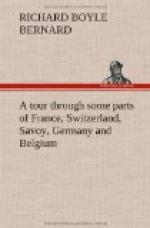these divisions is calculated to astonish, their perseverance
in repairing, and sometimes in rebuilding them, after
the torrents have carried them away, is not less worthy
of praise. The industry of the inhabitants seems
continually threatened by the vast masses of rock
which hang over their possessions, and which sometimes
cover them with ruin. We saw an enormous mass
which had fallen from one of the mountains, and is
now in the lake, having been removed thither by the
inhabitants after it had for some time completely obstructed
the road. We passed near the castle of Chillon,
which is singularly situated, being built on some
rocks in the lake, by which it is completely surrounded.
It consists of a number of circular towers, and was
formerly used as a state prison. A more secure
position, for such an edifice, it is difficult to
conceive. Before our arrival at Vevay, we saw
the village of Clarens, so much celebrated by Rousseau.
Vevay is a handsome town, with about 4,000 inhabitants;
and is, after Lausanne, the principal place in the
Canton of Vaud. The principal church is situated
on an eminence above the town; from its tower I saw
a most magnificent prospect, embracing nearly the
whole of the lake, (which is here nearly at its greatest
breadth) the entrance of the Rhone through a romantic
valley, and the stupendous scenery of the Alps, heightened
by the numerous villages on the Savoy side the lake.
For the union of wild and cultivated scenery this
view stands unequalled. No description of mine
could do it justice:
“Car la parole est toujours
reprimee
Quand le sujet surmonte le
disant.”
“When we most strongly
would delight express,
Words often fail in which
our thoughts to dress.”
In this church is the tomb of the celebrated General
Ludlow, who died here in 1693, aged 63. His monument,
according to custom, only speaks his praise; and makes
no mention of his having been a member of that assembly
which condemned the ill-fated Charles to death.
Over the door of the house he inhabited, is this motto,
‘Omne Solum Forti Patria.’
He had resided for some time at Lausanne, but fearing
the fate of Lisle, who was assassinated, he retired
to this place.
Between Vevay and Lausanne is the vineyard of Vaux,
which bears a great reputation. We passed through
the village of Cully and Lutri, both situated on the
lake, and after mounting a considerable hill arrived
at Lausanne, which is the capital of the Canton of
Vaud. It stands on three hills, and on the intervening
valleys, which being very steep, render its situation
more picturesque than convenient. It is situated
about 400 feet above the level of the lake, from which
it is distant about half a league; the village of
Ouchy serves as its port, and carries on a good deal
of trade. Lausanne contains several remains which
prove its antiquity, and several Roman inscriptions
are preserved in the townhouse, which is a handsome




